Appendix 1: Tables of district health board survey data
District health boards were within our central government sector, which was made up of 11 different entity types. The other 10 entity types were government departments, Crown agents or companies, autonomous Crown entities, independent Crown entities, central government – other, Māori Trust Boards, Rural Education Activities Programmes, Crown research institutes, tertiary education institutions, and State-owned enterprises.
These 11 entity types made up 45% of the total number of respondents from all public entities. The other respondents were working in schools (32.7%) and local government entities (22.3%).
The district health board respondents represented 5% of all respondents. The following graphs and tables compare the district health board results with the wider central government sector and the public sector overall.
We have rounded the percentages to the nearest whole number, so the percentages may not always add to 100.
Question 1: My organisation has a Fraud Policy.
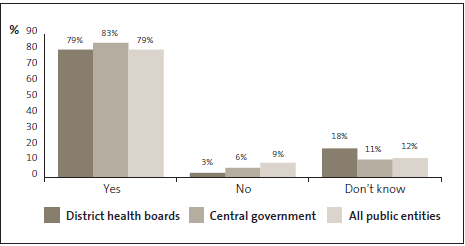
| Yes | No | Don't know | Total | ||||
|---|---|---|---|---|---|---|---|
| District health boards | 57 | 79% | 2 | 3% | 13 | 18% | 72 |
| Central government | 539 | 83% | 38 | 6% | 69 | 11% | 646 |
| All public entities | 1143 | 79% | 135 | 9% | 169 | 12% | 1447 |
Question 2: The Fraud Policy is communicated regularly (annually or biannually).
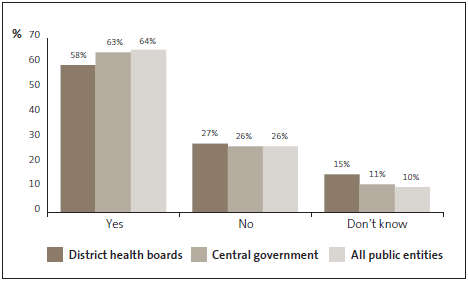
| Yes | No | Don't know | Total | ||||
|---|---|---|---|---|---|---|---|
| District health boards | 32 | 58% | 15 | 27% | 8 | 15% | 55 |
| Central government | 338 | 63% | 140 | 26% | 59 | 11% | 537 |
| All public entities | 735 | 64% | 295 | 26% | 113 | 10% | 1143 |
Question 3: My organisation has a staff Code of Conduct.
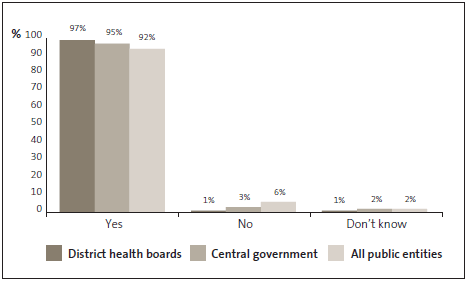
| Yes | No | Don't know | Total | ||||
|---|---|---|---|---|---|---|---|
| District health boards | 68 | 97% | 1 | 1% | 1 | 1% | 70 |
| Central government | 611 | 95% | 22 | 3% | 10 | 2% | 643 |
| All public entities | 1321 | 92% | 86 | 6% | 35 | 2% | 1442 |
Question 4: The staff Code of Conduct is communicated regularly (annually or biannually).
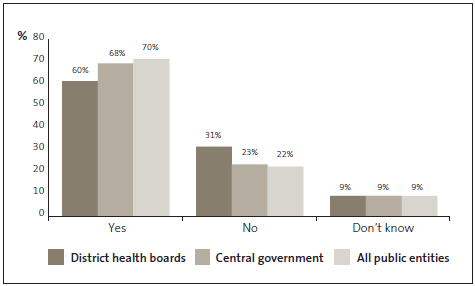
| Yes | No | Don't know | Total | ||||
|---|---|---|---|---|---|---|---|
| District health boards | 41 | 60% | 21 | 31% | 6 | 9% | 68 |
| Central government | 413 | 68% | 143 | 23% | 54 | 9% | 610 |
| All public entities | 921 | 70% | 286 | 22% | 115 | 9% | 1322 |
Question 5: My organisation has a clear policy on accepting gifts or services.
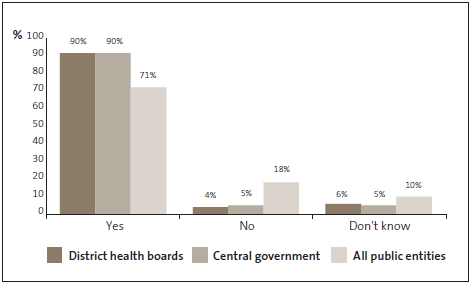
| Yes | No | Don't know | Total | ||||
|---|---|---|---|---|---|---|---|
| District health boards | 63 | 90% | 3 | 4% | 4 | 6% | 70 |
| Central government | 579 | 90% | 33 | 5% | 30 | 5% | 642 |
| All public entities | 1025 | 71% | 266 | 18% | 149 | 10% | 1440 |
Question 6: Receiving gifts, free or heavily discounted services or preferential treatment because of my role in my organisation is …
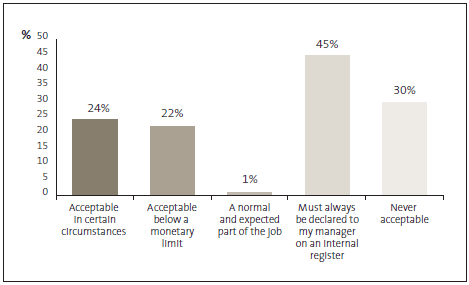
Note: The "right" answer to this question is a response that is in keeping with the entity's gifts policy.
Question 7: My organisation has designated a person who is responsible for fraud risks, including investigation.
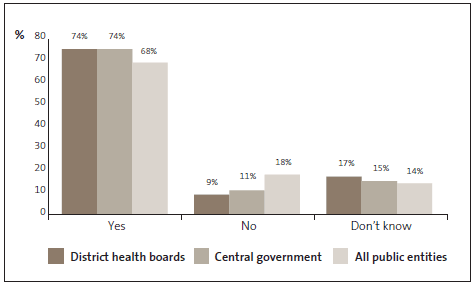
| Yes | No | Don't know | Total | ||||
|---|---|---|---|---|---|---|---|
| District health boards | 52 | 74% | 6 | 9% | 12 | 17% | 70 |
| Central government | 472 | 74% | 73 | 11% | 95 | 15% | 640 |
| All public entities | 971 | 68% | 258 | 18% | 206 | 14% | 1435 |
Question 8: I am confident that managers in my organisation understand their responsibilities for preventing and detecting the risks of fraud and corruption.
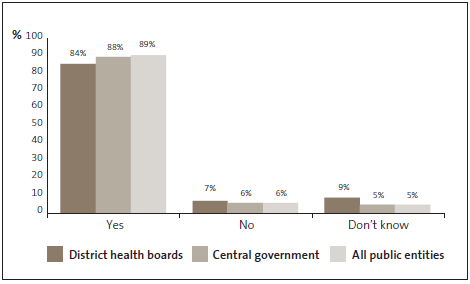
| Yes | No | Don't know | Total | ||||
|---|---|---|---|---|---|---|---|
| District health boards | 59 | 84% | 5 | 7% | 6 | 9% | 70 |
| Central government | 565 | 88% | 41 | 6% | 34 | 5% | 640 |
| All public entities | 1282 | 89% | 80 | 6% | 72 | 5% | 1434 |
Question 9: I am confident that other employees understand their responsibilities for preventing and detecting the risks of fraud and corruption.
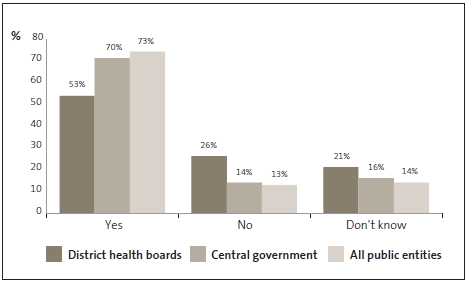
| Yes | No | Don't know | Total | ||||
|---|---|---|---|---|---|---|---|
| District health boards | 37 | 53% | 18 | 26% | 15 | 21% | 70 |
| Central government | 447 | 70% | 90 | 14% | 103 | 16% | 640 |
| All public entities | 1049 | 73% | 181 | 13% | 204 | 14% | 1434 |
Question 10: My organisation reviews its fraud controls on a regular basis (annually or biannually).
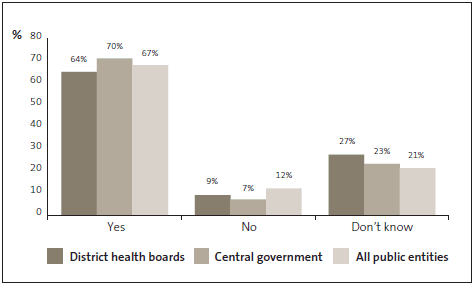
| Yes | No | Don't know | Total | ||||
|---|---|---|---|---|---|---|---|
| District health boards | 45 | 64% | 6 | 9% | 19 | 27% | 70 |
| Central government | 449 | 70% | 43 | 7% | 147 | 23% | 639 |
| All public entities | 960 | 67% | 178 | 12% | 295 | 21% | 1433 |
Question 11: My organisation takes a proactive approach to preventing fraud and corruption.
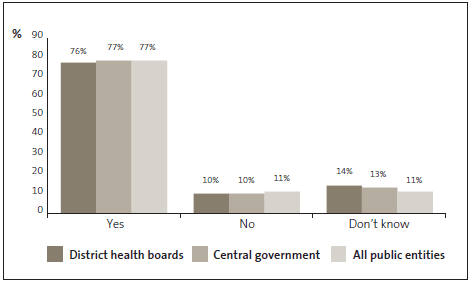
| Yes | No | Don't know | Total | ||||
|---|---|---|---|---|---|---|---|
| District health boards | 53 | 76% | 7 | 10% | 10 | 14% | 70 |
| Central government | 494 | 77% | 61 | 10% | 83 | 13% | 638 |
| All public entities | 1105 | 77% | 164 | 11% | 162 | 11% | 1431 |
Question 12: New employees at my organisation undergo pre-employment screening that includes criminal history checks.
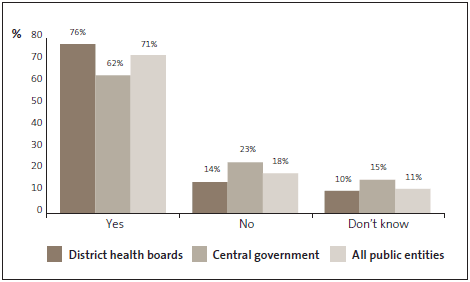
| Yes | No | Don't know | Total | ||||
|---|---|---|---|---|---|---|---|
| District health boards | 53 | 76% | 10 | 14% | 7 | 10% | 70 |
| Central government | 394 | 62% | 148 | 23% | 96 | 15% | 638 |
| All public entities | 1016 | 71% | 251 | 18% | 164 | 11% | 1431 |
Question 13: I have had fraud awareness training at my current organisation.
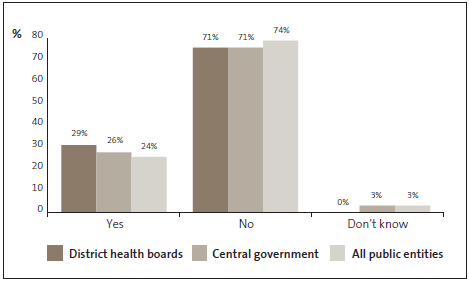
| Yes | No | Don't know | Total | ||||
|---|---|---|---|---|---|---|---|
| District health boards | 20 | 29% | 50 | 71% | 0 | - | 70 |
| Central government | 169 | 26% | 452 | 71% | 17 | 3% | 638 |
| All public entities | 338 | 24% | 1057 | 74% | 36 | 3% | 1431 |
Question 14: The fraud awareness training that I received at my current organisation was…
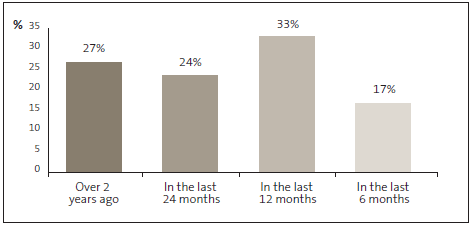
Question 15: My organisation carries out due diligence on new suppliers, including credit checks and checks for conflicts of interest.
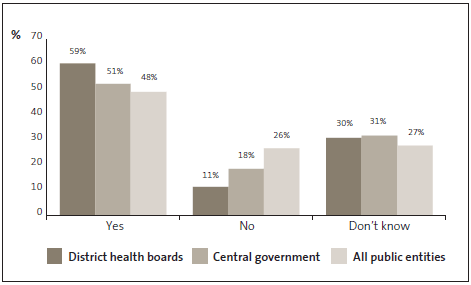
| Yes | No | Don't know | Total | ||||
|---|---|---|---|---|---|---|---|
| District health boards | 41 | 59% | 8 | 11% | 21 | 30% | 70 |
| Central government | 328 | 51% | 114 | 18% | 196 | 31% | 638 |
| All public entities | 680 | 48% | 366 | 26% | 385 | 27% | 1431 |
Question 16: My organisation encourages staff to come forward if they see or suspect fraud or corruption.
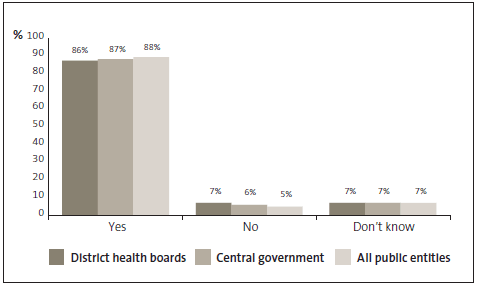
| Yes | No | Don't know | Total | ||||
|---|---|---|---|---|---|---|---|
| District health boards | 60 | 86% | 5 | 7% | 5 | 7% | 70 |
| Central government | 556 | 87% | 36 | 6% | 45 | 7% | 637 |
| All public entities | 1258 | 88% | 72 | 5% | 100 | 7% | 1430 |
Question 17: The culture at my organisation is such that I would be willing to raise any concerns that I may have regarding fraud or corruption and I know that my concerns will be taken seriously and I would not suffer any retaliation.
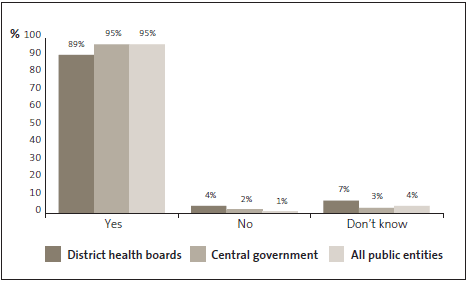
| Yes | No | Don't know | Total | ||||
|---|---|---|---|---|---|---|---|
| District health boards | 62 | 89% | 3 | 4% | 5 | 7% | 70 |
| Central government | 604 | 95% | 12 | 2% | 21 | 3% | 637 |
| All public entities | 1357 | 95% | 21 | 1% | 50 | 4% | 1428 |
Question 18: My organisation has a Protected Disclosures Policy (or similar).
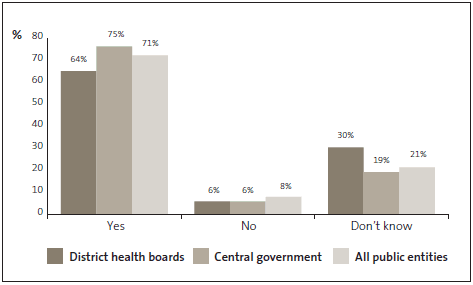
| Yes | No | Don't know | Total | ||||
|---|---|---|---|---|---|---|---|
| District health boards | 45 | 64% | 4 | 6% | 21 | 30% | 70 |
| Central government | 475 | 75% | 38 | 6% | 124 | 19% | 637 |
| All public entities | 1017 | 71% | 114 | 8% | 297 | 21% | 1428 |
Question 19: There is a whistleblower hotline at my organisation.
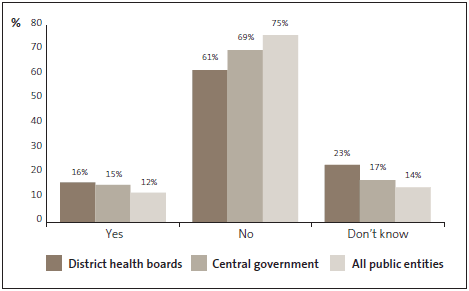
| Yes | No | Don't know | Total | ||||
|---|---|---|---|---|---|---|---|
| District health boards | 11 | 16% | 43 | 61% | 16 | 23% | 70 |
| Central government | 93 | 15% | 438 | 69% | 106 | 17% | 637 |
| All public entities | 166 | 12% | 1067 | 75% | 195 | 14% | 1428 |
Question 20: When fraud or corruption risks are raised at my organisation, my organisation takes proactive steps to reduce the risk.
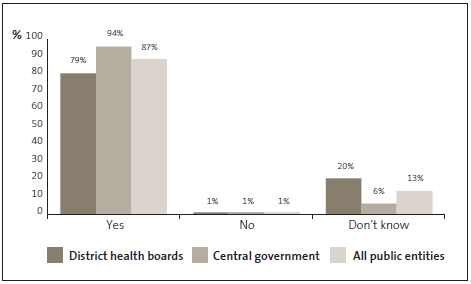
| Yes | No | Don't know | Total | ||||
|---|---|---|---|---|---|---|---|
| District health boards | 55 | 79% | 1 | 1% | 14 | 20% | 70 |
| Central government | 595 | 94% | 5 | 1% | 36 | 6% | 636 |
| All public entities | 1236 | 87% | 10 | 1% | 182 | 13% | 1428 |
Question 21: Credit card expenditure is closely monitored.
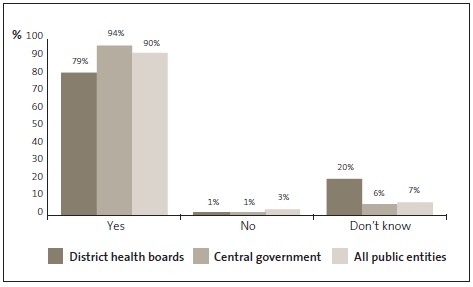
| Yes | No | Don't know | Total | ||||
|---|---|---|---|---|---|---|---|
| District health boards | 55 | 79% | 1 | 1% | 14 | 20% | 70 |
| Central government | 595 | 94% | 5 | 1% | 36 | 6% | 636 |
| All public entities | 1280 | 90% | 46 | 3% | 100 | 7% | 1426 |
Question 22: Staff expenses are closely monitored.
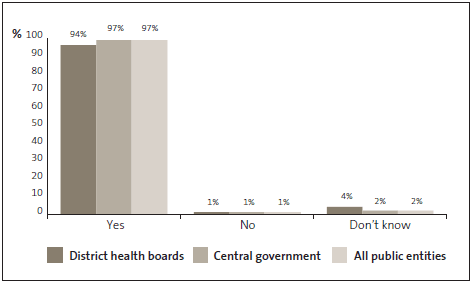
| Yes | No | Don't know | Total | ||||
|---|---|---|---|---|---|---|---|
| District health boards | 66 | 94% | 1 | 1% | 3 | 4% | 70 |
| Central government | 616 | 97% | 7 | 1% | 13 | 2% | 636 |
| All public entities | 1381 | 97% | 15 | 1% | 30 | 2% | 1426 |
Question 23: Should a fraud or corruption incident occur at my organisation, the investigation is conducted by ...
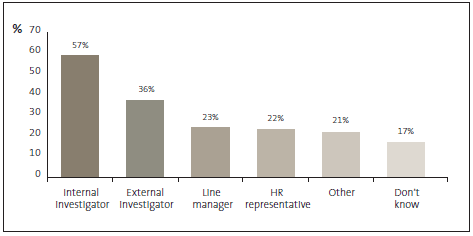
Question 24: Management communicates incidents of fraud to all staff at my organisation.
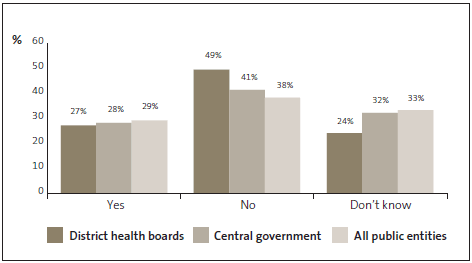
| Yes | No | Don't know | Total | ||||
|---|---|---|---|---|---|---|---|
| District health boards | 19 | 27% | 34 | 49% | 17 | 24% | 70 |
| Central government | 175 | 28% | 259 | 41% | 202 | 32% | 636 |
| All public entities | 416 | 29% | 546 | 38% | 464 | 33% | 1426 |
Question 25: I am aware of fraud or corruption incidents in the last two years that have gone unreported by my organisation.
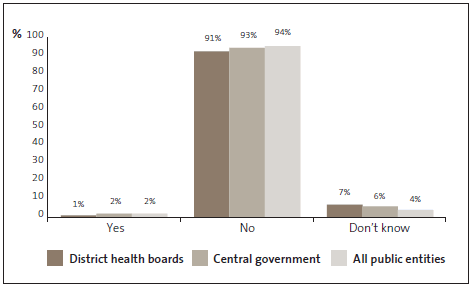
| Yes | No | Don't know | Total | ||||
|---|---|---|---|---|---|---|---|
| District health boards | 1 | 1% | 64 | 91% | 5 | 7% | 70 |
| Central government | 11 | 2% | 590 | 93% | 35 | 6% | 636 |
| All public entities | 22 | 2% | 1345 | 94% | 59 | 4% | 1426 |
Question 26: I am aware of fraud or corruption incidents in the last two years that have been reported but gone unpunished by my organisation.
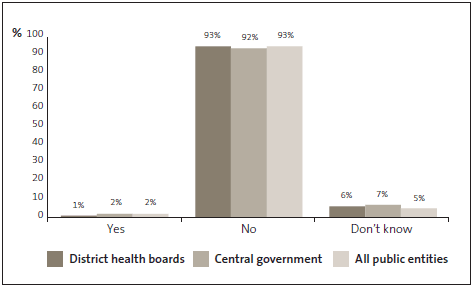
| Yes | No | Don't know | Total | ||||
|---|---|---|---|---|---|---|---|
| District health boards | 1 | 1% | 65 | 93% | 4 | 6% | 70 |
| Central government | 10 | 2% | 582 | 92% | 43 | 7% | 635 |
| All public entities | 26 | 2% | 1324 | 93% | 75 | 5% | 1425 |
Question 27: Inappropriate or personal credit card expenditure is taken very seriously and results in disciplinary action.
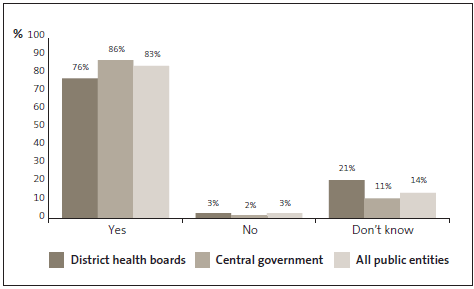
| Yes | No | Don't know | Total | ||||
|---|---|---|---|---|---|---|---|
| District health boards | 53 | 76% | 2 | 3% | 15 | 21% | 70 |
| Central government | 548 | 86% | 15 | 2% | 72 | 11% | 635 |
| All public entities | 1179 | 83% | 47 | 3% | 199 | 14% | 1425 |
Question 28: Inappropriate expense claims or expense claims for personal purchases are taken very seriously and result in disciplinary action.
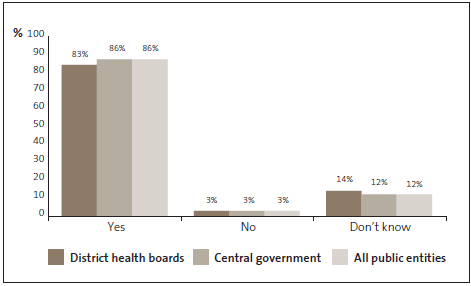
| Yes | No | Don't know | Total | ||||
|---|---|---|---|---|---|---|---|
| District health boards | 58 | 83% | 2 | 3% | 10 | 14% | 70 |
| Central government | 543 | 86% | 18 | 3% | 74 | 12% | 635 |
| All public entities | 1219 | 86% | 37 | 3% | 168 | 12% | 1424 |
Question 29: I am confident that my organisation will take all reasonable action to recover any money lost through fraud or corruption.
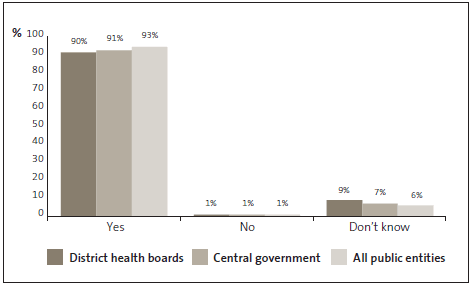
| Yes | No | Don't know | Total | ||||
|---|---|---|---|---|---|---|---|
| District health boards | 63 | 90% | 1 | 1% | 6 | 9% | 70 |
| Central government | 580 | 91% | 9 | 1% | 46 | 7% | 635 |
| All public entities | 1319 | 93% | 18 | 1% | 87 | 6% | 1424 |
Question 30: I am confident that incidents of fraud and corruption that occur at my organisation will be reported to the Police.
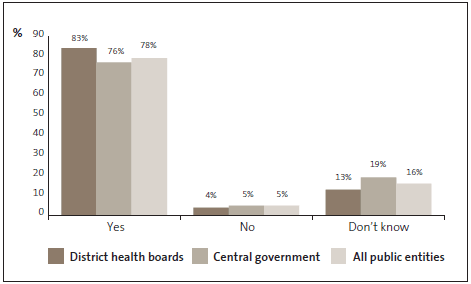
| Yes | No | Don't know | Total | ||||
|---|---|---|---|---|---|---|---|
| District health boards | 58 | 83% | 3 | 4% | 9 | 13% | 70 |
| Central government | 485 | 76% | 32 | 5% | 118 | 19% | 635 |
| All public entities | 1115 | 78% | 75 | 5% | 234 | 16% | 1424 |
Question 31: Internal controls are reviewed as part of every fraud investigation.
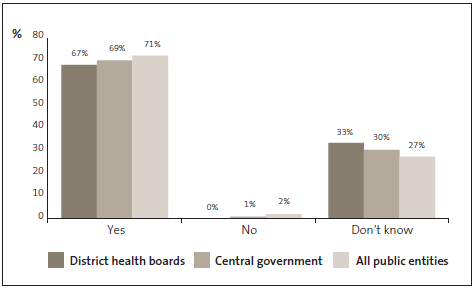
| Yes | No | Don't know | Total | ||||
|---|---|---|---|---|---|---|---|
| District health boards | 47 | 67% | 0 | - | 23 | 33% | 70 |
| Central government | 438 | 69% | 8 | 1% | 189 | 30% | 635 |
| All public entities | 1005 | 71% | 29 | 2% | 390 | 27% | 1424 |
Question 32: How many incidents of fraud or corruption are you aware of at your organisation in the last two years?
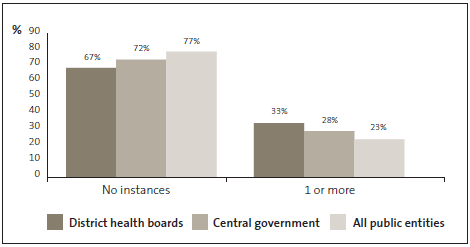
| No instances | 1 or more | Total | ||||
|---|---|---|---|---|---|---|
| District health boards | 47 | 67% | 23 | 33% | 70 | |
| Central government | 454 | 72% | 180 | 28% | 634 | |
| All public entities | 1102 | 77% | 320 | 23% | 1422 | |
Question 33: What is the total dollar amount of all incidents of fraud and corruption that you are aware have occurred at your organisation within the last two years?
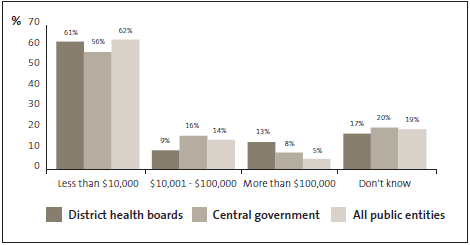
| District health boards | Central government | All public entities | ||||
|---|---|---|---|---|---|---|
| Less than $10,000 | 14 | 61% | 100 | 56% | 199 | 62% |
| $10,001 - $100,000 | 2 | 9% | 28 | 16% | 45 | 14% |
| More than $100,000 | 3 | 13% | 16 | 8% | 17 | 5% |
| Don't know | 4 | 17% | 37 | 20% | 59 | 19% |
| Total | 23 | 100% | 180 | 100% | 320 | 100% |
Question 34: In the most recent incident of fraud or corruption within your organisation that you are aware of, the main perpetrator(s) was ...
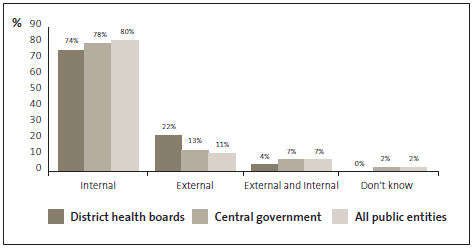
| District health boards | Central government | All public entities | ||||
|---|---|---|---|---|---|---|
| Internal (within the organisation) | 17 | 74% | 141 | 78% | 255 | 80% |
| External (outside the organisation) | 5 | 22% | 23 | 13% | 34 | 11% |
| A combination of external and internal (i.e. collusion) | 1 | 4% | 12 | 7% | 24 | 7% |
| Don't know | 0 | - | 4 | 2% | 7 | 2% |
| Total | 23 | 100% | 180 | 100% | 320 | 100% |
Question 35: In the most recent incident of fraud or corruption within your organisation that you are aware of and that involved internal parties, the main perpetrator(s) was ...
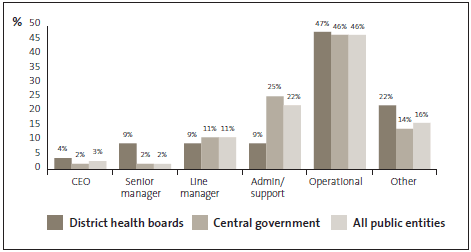
| District health boards | Central government | All public entities | ||||
|---|---|---|---|---|---|---|
| Chief Executive Officer/ Managing Director/ Principal | 1 | 4% | 4 | 2% | 8 | 3% |
| Member of the senior executive/leadership team or equivalent | 2 | 9% | 3 | 2% | 7 | 2% |
| Line manager | 2 | 9% | 19 | 11% | 36 | 11% |
| Admin/support services | 2 | 9% | 46 | 25% | 71 | 22% |
| Operational staff | 11 | 47% | 83 | 46% | 148 | 46% |
| Other | 5 | 22% | 25 | 14% | 50 | 16% |
| Total | 23 | 100% | 180 | 100% | 320 | 100% |
Question 36: In the most recent incident of fraud or corruption within your organisation that you are aware of, what type was committed?
| District health boards | Central government | All public entities | ||||
|---|---|---|---|---|---|---|
| No. | % | No. | % | No. | % | |
| Theft of cash | 2 | 7% | 37 | 17% | 85 | 21% |
| Theft of plant and equipment | 3 | 10% | 13 | 6% | 35 | 9% |
| Theft of inventory | 3 | 10% | 14 | 6% | 33 | 8% |
| Theft of intellectual property | 0 | - | 4 | 2% | 6 | 1% |
| Identity crime | 0 | - | 7 | 3% | 7 | 2% |
| Fraudulent expense claim | 5 | 17% | 38 | 17% | 55 | 14% |
| Fraudulent use of a credit card | 0 | - | 23 | 10% | 31 | 8% |
| Fraudulent use of a fuel card | 1 | 3% | 9 | 4% | 17 | 4% |
| False invoicing | 5 | 17% | 23 | 10% | 34 | 8% |
| Payroll fraud | 9 | 30% | 20 | 9% | 38 | 9% |
| Supplying false credentials | 1 | 3% | 6 | 3% | 7 | 2% |
| False claim for benefit | 0 | - | 2 | 1% | 2 | 0% |
| Financial statement fraud (overstatements) | 0 | - | 0 | - | 2 | 0% |
| Financial statement fraud (understatements) | 0 | - | 0 | - | 1 | 0% |
| Conflicts of interest | 1 | 3% | 17 | 8% | 27 | 7% |
| Provide false information or fraudulent alteration of documents | 0 | - | 3 | 1% | 9 | 2% |
| Don't know | 0 | - | 5 | 2% | 13 | 3% |
| Total | 30 | 100% | 221 | 100% | 402 | 100% |
Notes:
Theft of plant and equipment – such as computers, personal items.
Theft of intellectual property – such as confidential information/business information.
Identity crime – either misusing another person's identity or using a false identity.
False invoicing – either internally or externally created.
Payroll fraud – such as falsifying electronic or physical documents such as timesheets, annual leave returns, student numbers, payroll forms.
Supplying false credentials – such as a false CV.
False claim for benefit – such as ACC, Housing.
Conflicts of interest – such as paying or receiving backhanders, receiving undeclared gifts or services to influence decision-making or in return for preferential treatment.
Question 37: In the most recent incident of fraud or corruption within your organisation that you are aware of, how was it detected?
| District health boards | Central government | All public entities | ||||
|---|---|---|---|---|---|---|
| No. | % | No. | % | No. | % | |
| Whistle blowing system | 3 | 10% | 10 | 4% | 12 | 3% |
| Internal tip-off | 6 | 19% | 46 | 20% | 80 | 20% |
| External tip-off | 1 | 3% | 20 | 9% | 40 | 10% |
| Change of duties/ personnel | 2 | 6% | 11 | 5% | 17 | 4% |
| Accident (i.e. luck) | 1 | 3% | 9 | 4% | 17 | 4% |
| Internal control systems | 10 | 32% | 84 | 37% | 144 | 36% |
| Internal audit | 6 | 19% | 20 | 9% | 41 | 10% |
| External audit | 1 | 3% | 2 | 1% | 3 | 1% |
| Fraud detection system | 0 | - | 9 | 4% | 15 | 4% |
| Don't know | 1 | 3% | 14 | 6% | 26 | 7% |
| Total | 31 | 100% | 225 | 100% | 395 | 100% |
Question 38: In the most recent incident of fraud or corruption within your organisation that you are aware of, what was the estimated dollar amount involved?
| District health boards | Central government | All public entities | ||||
|---|---|---|---|---|---|---|
| No. | % | No. | % | No. | % | |
| No monetary loss | 4 | 17% | 26 | 14% | 48 | 15% |
| Less than $1,000 | 6 | 26% | 54 | 30% | 104 | 33% |
| Between $1,000 and $10,000 | 6 | 26% | 50 | 28% | 90 | 28% |
| Between $10,001 and $50,000 | 1 | 4% | 9 | 5% | 16 | 5% |
| Between $50,001 and $100,000 | 0 | 0% | 4 | 2% | 7 | 2% |
| Between $100,001 and $500,000 | 1 | 4% | 7 | 4% | 7 | 2% |
| More than $500,000 | 1 | 4% | 2 | 1% | 3 | 1% |
| Don't know | 4 | 17% | 28 | 16% | 44 | 14% |
| Total | 23 | 100% | 180 | 100% | 319 | 100% |
Question 39: In the most recent incident of fraud or corruption within your organisation that you are aware of, what was the main reason that enabled it to occur?
| District health boards | Central Government | All surveyed public entities | ||||
|---|---|---|---|---|---|---|
| No. | % | No. | % | No. | % | |
| Inadequate internal control policies and procedures | 4 | 19% | 14 | 8% | 26 | 8% |
| Internal control policies and procedures not followed | 5 | 24% | 59 | 33% | 85 | 27% |
| Poor segregation of duties | 0 | - | 6 | 3% | 10 | 3% |
| Easy access to cash | 0 | - | 7 | 4% | 19 | 6% |
| Management override of controls | 2 | 10% | 7 | 4% | 15 | 5% |
| It was a new type of fraud that our organisation was unprepared for | 0 | - | 4 | 2% | 12 | 4% |
| Person didn't think they would get caught | 8 | 38% | 68 | 39% | 127 | 40% |
| Don't know | 2 | 10% | 12 | 7% | 22 | 7% |
| Total | 21 | 100% | 177 | 100% | 316 | 100% |
Question 40: In the most recent incident of fraud or corruption within your organisation that you are aware of, what action was taken against the perpetrator(s)?
| District health boards | Central government | All public entities | ||||
|---|---|---|---|---|---|---|
| No. | % | No. | % | No. | % | |
| No action was taken | 2 | 10% | 5 | 3% | 14 | 5% |
| Insufficient evidence or culprit not identified | 0 | - | 7 | 4% | 10 | 3% |
| Decision/action pending | 1 | 5% | 10 | 6% | 15 | 5% |
| Allowed to resign and not reported to relevant authorities | 1 | 5% | 20 | 11% | 35 | 11% |
| Allowed to resign but reported to relevant authorities | 0 | - | 14 | 8% | 23 | 7% |
| Disciplined without any report to relevant authorities | 1 | 5% | 16 | 9% | 40 | 13% |
| Disciplined and reported to relevant authorities | 0 | - | 13 | 7% | 19 | 6% |
| Dismissed without any report to relevant authorities | 2 | 10% | 21 | 12% | 44 | 14% |
| Dismissed and reported to relevant authorities | 9 | 45% | 45 | 26% | 81 | 26% |
| Don't know | 4 | 20% | 23 | 13% | 30 | 10% |
| Total | 20 | 100% | 174 | 100% | 311 | 100% |
Question 41: I feel secure in my job.
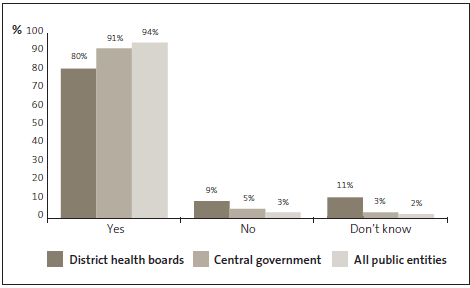
| Yes | No | Don't know | Total | ||||
|---|---|---|---|---|---|---|---|
| District health boards | 56 | 80% | 6 | 9% | 8 | 11% | 70 |
| Central government | 577 | 91% | 34 | 5% | 22 | 3% | 633 |
| All public entities | 1341 | 94% | 46 | 3% | 33 | 2% | 1420 |
Question 42: Budgetary constraints mean that my team has to achieve higher targets with fewer resources.
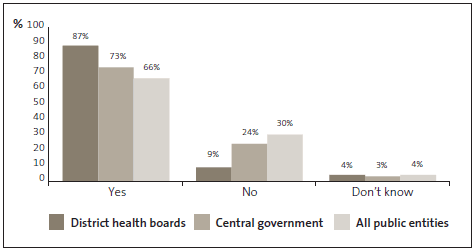
| Yes | No | Don't know | Total | ||||
|---|---|---|---|---|---|---|---|
| District health boards | 61 | 87% | 6 | 9% | 3 | 4% | 70 |
| Central government | 465 | 73% | 150 | 24% | 18 | 3% | 633 |
| All public entities | 943 | 66% | 423 | 30% | 54 | 4% | 1420 |
